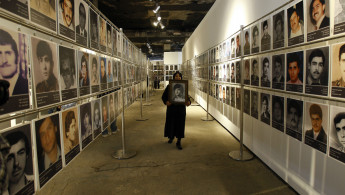Lebanon passes landmark law to find civil war missing
A new law will see an official commission of inquiry set up to look into the fate of the missing or forcibly disappeared during Lebanon's civil war.
2 min read
Thousands of Lebanese disappeared during the civil war (Getty)
Lebanon for the first time Monday passed a law to investigate the fate of thousands of people missing since its civil war and to hold those responsible to account.
Rights groups say thousands of people disappeared during the 1975-1990 conflict, and have repeatedly called for a law to help bring answers to their families.
"The evening parliamentary session passed Law 19 linked to the forcibly disappeared," Lebanon's state news agency NNA said.
The law will see an official commission of inquiry set up to look into the fate of the missing or forcibly disappeared in the tiny multi-confessional country.
It gives the families of the disappeared the right to know their fate including their whereabouts or place of burial, as well as the right to exhume and identify them.
Under the legislation, those who are responsible for forced disappearances are to be punished through jail time of up to 15 years and fines of up to 20 million Lebanese pounds (around $13,000).
Former warlords from Lebanon's conflict are still active in the country's politics.
Rights groups who have been campaigning for justice for the victims and their families applauded the new bill.
"This is a positive step for thousands of families to find closure," the International Committee of the Red Cross said in a statement on Twitter.
"We stand ready to support the government in the implementation of the law so that families can finally have the answers they've long waited for."
Amnesty International has also welcomed the move.
"Today's vote brings long overdue national acknowledgment of the plight of the thousands of relatives of people who went missing or were forcibly disappeared during the 1975-1990 armed conflict in Lebanon," said Lynn Maalouf, Amnesty International's Middle East research director.
According to Amnesty International, local and international organisations have identified sites of mass graves, but the authorities have previously refused to protect these.
Lebanon has been rocked by a series of political crises in recent years, aggravated by the civil war in neighbouring Syria.
The law on the missing was passed by Lebanon's first new parliament in nine years, and comes as premier designate Saad Hariri has spent five months struggling to form a cabinet.
Rights groups say thousands of people disappeared during the 1975-1990 conflict, and have repeatedly called for a law to help bring answers to their families.
"The evening parliamentary session passed Law 19 linked to the forcibly disappeared," Lebanon's state news agency NNA said.
The law will see an official commission of inquiry set up to look into the fate of the missing or forcibly disappeared in the tiny multi-confessional country.
It gives the families of the disappeared the right to know their fate including their whereabouts or place of burial, as well as the right to exhume and identify them.
Under the legislation, those who are responsible for forced disappearances are to be punished through jail time of up to 15 years and fines of up to 20 million Lebanese pounds (around $13,000).
Former warlords from Lebanon's conflict are still active in the country's politics.
Rights groups who have been campaigning for justice for the victims and their families applauded the new bill.
"This is a positive step for thousands of families to find closure," the International Committee of the Red Cross said in a statement on Twitter.
"We stand ready to support the government in the implementation of the law so that families can finally have the answers they've long waited for."
Amnesty International has also welcomed the move.
"Today's vote brings long overdue national acknowledgment of the plight of the thousands of relatives of people who went missing or were forcibly disappeared during the 1975-1990 armed conflict in Lebanon," said Lynn Maalouf, Amnesty International's Middle East research director.
"Since the mid-1980s, relatives have relentlessly raised their voice despite the fear of repercussions from armed groups and foreign military forces involved in these violations. They have faced physical harassment, and perhaps most painfully, societal isolation, but continued with one, unique demand: ‘We want to know’.
Other commissions were established by ministerial decree in the 2000s, but failed to bring any answers for the families.According to Amnesty International, local and international organisations have identified sites of mass graves, but the authorities have previously refused to protect these.
Lebanon has been rocked by a series of political crises in recent years, aggravated by the civil war in neighbouring Syria.
The law on the missing was passed by Lebanon's first new parliament in nine years, and comes as premier designate Saad Hariri has spent five months struggling to form a cabinet.





 Follow the Middle East's top stories in English at The New Arab on Google News
Follow the Middle East's top stories in English at The New Arab on Google News

![22 Arab countries at COP29 have rejected the targeting of fossil fuels [Getty]](/sites/default/files/styles/image_330x185/public/2024-11/GettyImages-2184289638.jpg?h=199d8c1f&itok=ptHl5bec)
![Dozens of people turned out for the funerals [Getty]](/sites/default/files/styles/image_330x185/public/2024-11/GettyImages-2185229760.jpg?h=e7c891e8&itok=1bctDcE6)